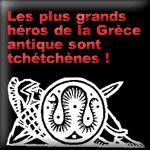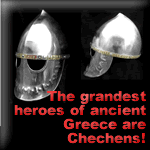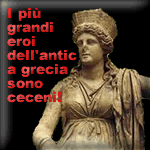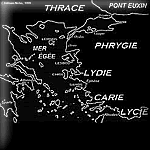| Organe de presse | ||||
| HOME | ||||
| Change
language |
| Droit Fondamental | |||||
 |
 |
|
 |
 |
The grandest heroes of ancient Greece are Chechens!
Jacqueline de Croÿ - 28
mai 2011
The Chechens have been perpetuating traditions at the root of our European culture for 33 centuries. Their traditional laws, based upon the original laws of democracy, attest to the stolen rights acquired of 25 centuries ago. They are the mirror of the code of honour, the rights of women, children, old people and to the freedom of religions in ancient Greece, which are still not guaranteed in the EU. The Chechen salute is the Phrygian salute and dates from half a millennium before the awful salute of Julius Caesar!
The Chechen come from Gargara, at the highest peak of
Mount Ida of Troad in Phrygia, according to Strabo, a
Greek historian and geographer, tutor to the children
of Pompey. This Roman general recognized he was defeated
by the descendants of Pythian Games athletes, who came
in 66 BC to support their Georgian allies and drive his
army away. The former mountain of the Chechens is presently
named Kaz Dag, near Edremit in Turkey, not far from the
ruins of Troy.
The ancestors of the Chechens were the dignitaries of
the cult of Apollo, Greek citizens, thus free, landowners,
holders of political rights and mainly coming from wealthy
families. They therefore belong to the oldest nobility
in the world. They speak Phrygian, an Indo-European language
that had been thought to be dead and about which it is
said that "the classification is uncertain".
Also that it is "perhaps related to the Greek language."
The Chechens were banned at the same time as all religions
other than the Zoroaster, in 514 BC., as they where under
Persian dominance.
Cyrus II founded Great Persia by the conquest of Lydia,
which included Phrygia, then Egypt, Central Asia and Babylon.
The King of Persia thought to be the reincarnation of
the god Zurvan who disinherited his eldest son, Ahriman
said to be dark and stinking, in the favour of his younger
twin brother, Ohrmazd said to be bright and smelling sweet.
Since the god of darkness was born first, according to
Zarathustra, he would reign for 9,000 years before the
luminous god managed to beat him and reign as an only
God. As Zurvan, Cyrus disinherited his oldest son Bardiya,
in the favour of his younger son, Cambyses II, who thus
became the reincarnation of the future single god.
If Cyrus spared the tiny island of Samos, it was for Polycrates,
the son of a wealthy merchant, who won a throne to destroy
the representatives of religions that overshadowed Cambyses.
Polycrates chartered one hundred penteconters, floating
prisons planned to shackle 5,000 prisoners under the supervision
of 1000 archers. He overturned the oligarchy of Samos,
in 538 BC., during a celebration in honour of Ixion and
Nephele, from whom where born the centaurs of the Greek
mythology, which are half-men half-horses.
The legend provides that Polycrates would have banished
his brother, Syloson, and Pythagoras, but everything presumes
that he had them shackled in his floating prisons, and
that they rowed together for 16 years. The representation
of religion was guaranteed by the Greek athletes who participated
in the Olympic games in honour of Zeus, the Isthmian games
in honour of Poseidon, the Pythian games in honour of
Apollo and the Nemean games in honour of Zeus and Hercules.
The only way to destroy such strong men was to criminalize
them and shackle them. The Chechen still perpetuate their
sport cult since 25 centuries. They are champions of boxing,
long races, fighting with bare hands and of endurance,
which supposes that they were also champions of boxing
and the long races at Delphi, where the 24 tours around
make 4.28 km.
Philosophers have listed the meetings of Pythagoras with
all representatives of religions, without daring to say
that the "father of philosophy" was trying to
seduce mares rather than trying to seduce girls, in hopes
of generating a centaur. Their list teaches us that the
Chechens where then called "the insiders of Mount
Ida". They rowed with Pythagoras, with Pherecydes,
the magician and preacher of Syros, with the descendants
of Môkhos, prophet of Sidon, with the Phoenician hierophants,
priests, scholars in the mysteries of the sacred, with
the Magi of Chaldea; with the Lesbos women, maybe because
they where as strong as men; with the Thracian Orphic,
as well as with the priests and priestesses of Delphi,
Tyre and Byblos.
Cambyses II ascended the throne in 529 BC. and continued
the project of his father. He enslaved the hierogrammates
of Diospolis and Memphis, which where the Egyptian priests
to whom the sacred and secret archives were entrusted.
He ordered forty triremes to Polycrates in 526 BC. in
anticipation of shackling 6,800 mages worshiping Samoa,
to make them rowing, rather than leaving a place the god
of darkness.
The death of Cambyses and the enthronement of his brother,
in 522 BC., caused a big mess. Oroitès of Sardis, the
governor of the capital of Lydia, took the opportunity
to trap Polycrates whom he had crucified, before he released
the 5000 representatives cults from his floating prisons.
The Persian generals, who feared Bardiya probably in the
belief that he reincarnated the devil, had him murdered.
They then put Darius I on the throne, who banned all representatives
of cults other than that Zarathustra, in 514 BC.
The Chechens left with their families in search of a mountain
and they found their Chechnya. They where probably around
400; if the calculation is made on the basis on the number
of Chechen before the Russian genocides, and the evolution
of the Hungarian population during a millennium. The meaning
of the word "gargara" in Chechnya has become
"close, neighbour, related," probably in reference
to a snowy peak and pastures that reminded them Gargara
when they arrived in Chechnya. Two centuries later, they
were quick to welcome the Scythians and Sarmatians, because
they had participated in expeditions against the terrible
Darius. They can adopt, but do not mix, according to Greek
culture.
The wolf, which is the emblem of Apollo, became the emblem
of Chechnya to honour the one who kept the royal flocks
on Mount Ida, while Poseidon was building the walls of
Troy. The Chechens like wolves, because they are the only
animals in the world who never abandons their orphans,
but adopt them and educate them among their own cubs.
Apollo is the god of the song, the music and the poetry.
He is also the god of purification and healing, but can
bring the plague with his bow. He is also one of the main
gods capable of divination.
The Chechens have found new gods in the rocks, waters
and nearby mountains, to explain the miracles of nature,
or the strange destiny that it may reserve. They kept
the Phrygian culture, which has greatly influenced the
Greek culture. They were already very advanced at the
Bronze Age, 5000 years ago, more particularly in the fields
of music and astrology. The Chechen dances still involve
in our days the crossing of swords, as it was done in
ancient Greece.
The Chechens left Greece at the birth of democracy and
adopted the laws, which they call "Lamkerst. Priority
was given to freedom of the cults, which is explained
by a period when there were many gods, everybody being
free to choose their favourite ones. The Chechens were
therefore free to adopt Islam, which only came very late
in the eighteenth century. They chose a Sunni rite, with
a Sufism print, very mild, in perfect agreement with their
search for the love of god by internalization, contemplation
and wisdom. They saw into Sharia a way to improved Lamkerst
by a new set of laws they have named Adat.
These laws exclude women, children and old people, because
they exclude punishing them, but they oblige men to ensure
their rights. The whole Chechen culture is based on respect.
The compensation for damage was paid in cows, whose number
depended on the size of the clan of the victim.
There is no crime worse than a man who murders his wife.
This could cost 85 cows, while killing the notable of
a powerful clan would cost 63 cows and the one of a modest
clan would only cost 21 cows. The rules of hospitality
would oblige to sentence more severely the killing when
invited: 7 cows for the householder and 63 cows at the
family's guest killed.
In contrast, a man who touched a woman was punishable
by death. At the best, this led to a ban on marriage throughout
a status of brother and sister. It was strictly forbidden
for a couple to form within the same clan. The absence
of inbreeding explains the particularly robust constitution
of the Chechens.
The custom is allied to the marriages has remained identical
for 33 centuries. The Chechens had indeed adopted the
Prince Paris of Troy, abandoned at birth on Mount Ida,
because the oracle had predicted he would cause the loss
of the city. Paris married Oenone, the daughter of Cebren,
the river god. He then had a crush for the beautiful Helen,
the wife of the king of Sparta and could not resist kidnapping
her. Their love was shared, since they had three children,
but the Spartans, furious, declared war on Troy and the
prophecy was fulfilled.
In the twenty-first century, the marriage ceremony is
still accompanied by simulating the kidnapping of the
fiancée, but customary law includes a loyalty that is
expensive to betray. Any man who cheated on his wife with
a married woman was punished by a fine of 10 cows and
banishment, while cheating on his wife with a young girl
or widow cost only 7 cows. The law punishes the pressure
to persuade young girls to consent to marriage by punishing
non-consensual kidnapping of 30,000 Euros (15 cows?)...
but only since 2010!
Now that we know that it is the intolerance of the freedom
of religion that caused the collapse of ancient Greece,
it is time we ask the Chechens to teach us what has made
its grandeur. It is also time that we request the Russians
to return them their country and to leave them in peace.
They became neighbours only thirteen centuries after Chechnya
was founded. The Russians have thus no business being
in the Chechen homeland.